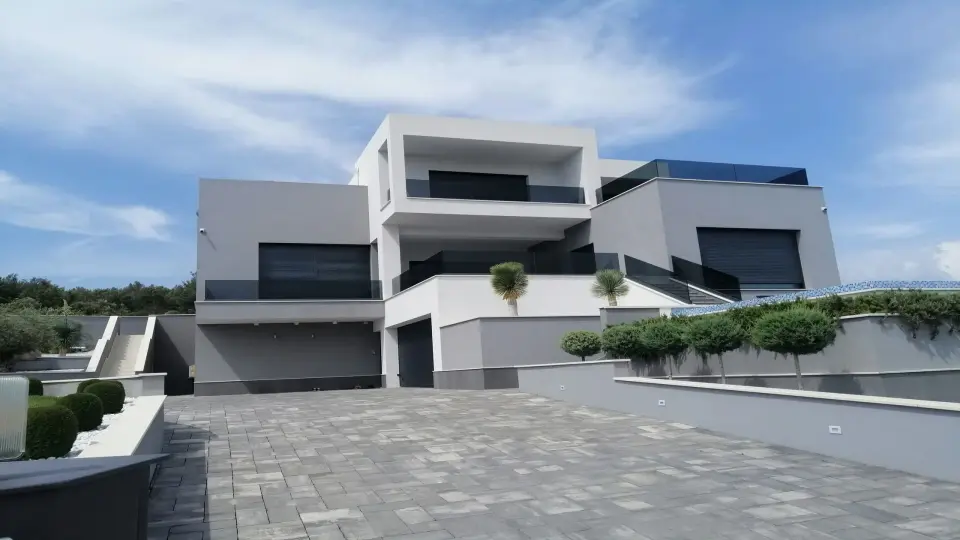Vrbo Host Requirements: Complete Guide to Getting Started in 2025

Vrbo hosts know why it pays to be on Vrbo. As one of the Big Three OTAs (alongside Airbnb and Booking.com), Vrbo has the brand power to attract millions of travelers to its site. If you get onboard the Vrbo train, some of those millions will end up at your short-term rental property.
But in order to tap into the ecosystem, you must first meet Vrbo's host requirements. As far as must-haves go in the vacation rental industry, Vrbo requirements are generally more stringent than other OTAs.
This comprehensive guide covers everything you need to know about VRBO host requirements, helping you navigate the process of becoming a VRBO host while avoiding common pitfalls that could derail your vacation rental business.
Essential VRBO Host Requirements Overview
Before you can list your property on the VRBO website, you must meet a few specific criteria as a host. While perhaps more onerous than what you will find on other major OTAs, they are very attainable and straightforward.
Age and identity verification
VRBO hosts have to be 18 years or older and complete identity verification within 24 hours of account creation. You'll also need government-issued photo ID and phone confirmation via text or call.
Property type restrictions
VRBO exclusively accepts whole-home rentals — guests must have exclusive access to the entire property during their stay. Unlike other platforms that allow shared spaces, VRBO requirements mandate that guests have complete privacy with their own kitchen, bathroom, and living areas.
Legal compliance obligations
As you might expect, every VRBO host must comply with all applicable local laws and regulations governing short-term rentals. This could include elements like obtaining business licenses, short-term rental permits and various tax registrations in your local jurisdiction. Property managers need to complete these steps before listing on Vrbo.
Insurance coverage requirements
Comprehensive liability insurance covering vacation rental activities is mandatory for all Vrbo hosts. Standard homeowner’s insurance typically doesn’t cover commercial rental activities, so many hosts need specialized vacation rental insurance. The OTA does offer property damage protection, but to host on Vrbo, you'll need broader coverage
Safety standards compliance
Following requirements with respect to basic safety is also a must. This includes properly installed and functional smoke detectors, carbon monoxide alarms and fire extinguishers in all required areas. And like any other licensed business, 24/7 emergency contact information and evacuation procedures should be clearly posted.

Property Eligibility Requirements
Vrbo's focus on whole-home rentals creates specific eligibility criteria that differentiate it from others in the vacation rental industry. Your property listing simply will not qualify if it doesn't meet the following criteria.
Acceptable property types
Vrbo accepts various property types including houses, condos, cabins, villas, and apartments, provided they meet the exclusive access requirement. The key factor isn’t the property type but rather the guest’s ability to enjoy complete privacy during their stay. Self-contained units with private entrances and exits are essential Vrbo host requirements.
Exclusive access requirements
Guests must have exclusive access to all key amenities including kitchens, bathrooms, living areas, and bedrooms. Properties cannot share these specific spaces with hosts or other guests during the booking period.
Outdoor amenities and special features
Properties with outdoor amenities like a private pool, hot tub, or extensive outdoor space often perform better on the platform — i.e. increase bookings. These features can help your property stand out in competitive markets and justify higher nightly rates. However, any advertised amenities must be exclusively available to guests during their stay.

Location and accessibility
While VRBO doesn’t restrict a property's location, Vrbo hosts must comply with local zoning laws that permit short term rentals. Some areas have strict regulations or outright bans on vacation rentals, making location research crucial before investing in a rental property for VRBO hosting.
Legal and Regulatory Compliance
Navigating the complex web of local regulations represents one of the most challenging aspects of managing a vacation rental property. Legal compliance requirements vary significantly by location, making thorough research essential for every property owner.
Zoning law research
Local zoning laws often restrict or prohibit short-term rentals in certain areas. Many municipalities have specific zones where vacation rentals are permitted, while residential areas may face complete bans. Research your property’s zoning classification and verify that short-term rentals are allowed before proceeding with your Vrbo listing.
Licensing and permit requirements
Most jurisdictions require vacation rental operators to obtain specific business licenses and short-term rental permits. Some cities cap the number of permits issued, creating waiting lists for new applicants. The permit application process can take several months, so start early to avoid delays in launching your rental business.
Tax registration and obligations
Vacation rental owners must register with local tax authorities for transient occupancy taxes, often called “bed taxes” or “hotel taxes.” These taxes vary by location but typically range from 3-15% of the nightly rate. Proper tax registration and remittance are crucial for avoiding penalties and maintaining legal compliance.
HOA and community restrictions
Homeowners associations frequently restrict or prohibit short-term rentals through community guidelines or covenants. Review your HOA documents carefully and obtain written confirmation that vacation rentals are permitted. Some HOAs may allow rentals but impose restrictions on minimum stay lengths or guest numbers.

Documentation and record keeping
Maintain comprehensive documentation proving your legal right to operate a vacation rental. This includes property ownership documents, rental permits, tax registrations, and insurance policies. Proper documentation protects your business and demonstrates compliance to both Vrbo and local authorities.
Staying Updated on regulatory changes
Municipal regulations affecting vacation rentals change frequently as communities adapt to tourism impacts. Subscribe to local government updates and join vacation rental owner associations to stay informed about regulatory changes that could affect your property listing.
VRBO Listing Requirements and Standards
Vrbo host requirements also stipulate adherence to specific content and quality standards, such as Vrbo's photo requirements, property description standards and transparent fee disclosure.
Property description standards
VRBO listing requirements mandate accurate property descriptions with a minimum of 400 characters of original text. The platform prohibits copying content from other listings, requiring hosts to craft unique descriptions highlighting their property’s distinctive features. Your headline must contain at least 80 characters describing key amenities and location benefits.
Comprehensive amenity listings
Complete and accurate amenity listings are essential for setting proper guest expectations and avoiding disappointing reviews. Include all available amenities such as Wi-Fi, parking availability, kitchen appliances, and entertainment options. Be specific about amenity details — for example, note if Wi-Fi has speed limitations or if parking spaces are limited.
Transparent fee disclosure
All additional fees must be clearly disclosed in your listing, including cleaning fees, pet charges, and any other supplementary costs. Hidden fees frustrate guests and often result in negative reviews that can damage your listing’s performance. Transparency builds trust and helps attract bookings from guests who appreciate honest pricing.
House rules and policies
Clear house rules protect your property while setting appropriate guest expectations. Cover essential topics like maximum occupancy limits, pet policies, smoking restrictions, and noise considerations. Well-defined house rules can help prevent property damage and reduce conflicts with neighbors or local authorities.
Calendar management and availability
Maintain accurate calendar availability to prevent double bookings and ensure reliable guest experiences. Regular calendar updates demonstrate professionalism and help avoid the penalties associated with host-initiated cancellations. Many hosts use vacation rental software to sync calendars across multiple platforms automatically.
Photo Requirements and Quality Standards
High quality photos are arguably the most critical element of your Vrbo listing, directly impacting booking rates and guest satisfaction. Vrbo photo requirements ensure listings maintain professional standards while accurately representing properties.
Minimum photo requirements
VRBO requires a minimum of six photos per listing, though hosts should aim for 25 or more high-quality photos to maximize listing visibility and booking potential. Photos must be in landscape orientation with minimum resolution of 1024 x 683 pixels and file sizes under 20 MB per image.
Photo quality and content standards
Another Vrbo photo requirement stipulates all photos must be original, without watermarks, filters, or black-and-white processing. Images should accurately represent the property without misleading angles or staging that misrepresents the space. Professional photography often provides the best return on investment for vacation rental owners.
Required photo categories
Include photos covering all essential areas: exterior shots showing the property’s curb appeal, all bedrooms with clear views of sleeping arrangements, bathrooms highlighting cleanliness and amenities, kitchen showcasing appliances and workspace, and living areas demonstrating comfort and entertainment options.
Staging and presentation tips
Stage your property professionally for photos by decluttering spaces, maximizing natural light, and highlighting unique features. Photos should showcase the property at its best while remaining truthful to the guest experience. Consider hiring a professional photographer experienced with vacation rental photography for optimal results.
Seasonal photo updates
Consider updating photos seasonally to showcase different aspects of your property throughout the year. Vrbo listings with outdoor amenities benefit from photos showing summer and winter usage, while those near local attractions might highlight seasonal activities.

Safety and Insurance Requirements
Guest safety represents a non-negotiable priority for VRBO hosts, with specific requirements designed to protect visitors and minimize liability exposure for property owners.
Essential safety equipment
Install smoke detectors in all required areas according to local fire codes, typically including bedrooms, hallways, and living areas. Carbon monoxide alarms are mandatory in properties with fuel-burning appliances or attached garages. Fire extinguishers should be easily accessible and regularly inspected for proper function.
Emergency preparedness protocols
Provide clear emergency information including local emergency services numbers, hospital locations, and property address details. Post evacuation routes in visible locations and ensure all exits remain unobstructed. Consider backup power sources for essential systems during outages, particularly in areas prone to severe weather.
First aid and guest safety resources
Maintain an accessible first aid kit stocked with basic medical supplies. Provide emergency contact information for a 24/7 contact person who can assist with urgent guest issues. Clear communication about potential hazards, such as steep stairs or low-hanging fixtures, helps prevent accidents.
Childproofing considerations
Properties marketed as family-friendly should include appropriate childproofing measures such as outlet covers, cabinet locks, and pool barriers where applicable. Even properties not specifically targeting families benefit from basic safety measures that protect children who may visit.
Insurance coverage essentials
Secure comprehensive vacation rental insurance that covers liability, property damage, and loss of rental income. Standard homeowner’s insurance typically excludes coverage for commercial rental activities, making specialized coverage essential. Review policy details carefully to understand coverage limitations and exclusions.
Regular safety inspections
Conduct regular safety equipment testing and maintenance to ensure all systems function properly. Document inspection dates and maintenance activities to demonstrate due diligence in safety compliance. Many insurance policies require regular safety equipment testing for coverage validity.

VRBO Pricing Models and Fee Structure
Understanding Vrbo's fee structure and choosing the right pricing model significantly impacts your Vrbo listing's profitability and booking success.
Key elements of Vrbo's host fees structure
VRBO offers two primary pricing models: an annual subscription fee of $499 or an 8% pay-per-booking commission on each reservation. The annual subscription becomes cost-effective for properties generating more than 250 nights of bookings annually, while the pay-per-booking model works better for seasonal or occasional rentals.
Subscription vs. commission comparison
The annual subscription fee provides unlimited bookings without per-reservation charges, making it ideal for consistently booked properties. The 8% commission model requires no upfront payment but reduces profit margins on each booking. Calculate your expected booking volume to determine which option maximizes profitability.
Additional platform features
Both pricing models include secure payment processing, basic listing tools, and access to VRBO’s booking platform. Enhanced features like professional photography services or premium listing placement may incur additional charges. Evaluate these optional services based on their potential return on investment for your specific property.
Payment processing and timing
VRBO handles all guest payment processing and typically releases funds to hosts 24 hours after guest check-in. This payment timing helps protect guests while ensuring hosts receive payment for confirmed stays. Understanding payment schedules helps with cash flow planning for your rental business.

Guest Communication and Service Standards
Exceptional guest communication distinguishes great hosts from average Vrbo hosts, directly impacting booking rates, reviews, and repeat business — all of which contribute to more bookings.
Vrbo response time requirements
Respond to booking requests and guest inquiries within one hour whenever possible to maximize conversion rates. Quick response times demonstrate professionalism and increase the likelihood of securing bookings in competitive markets. Many hosts use automation tools to send immediate acknowledgment messages while crafting personalized responses.
Pre-arrival communication
Provide detailed check-in instructions including property addresses, access codes, and arrival procedures well before guest arrival. Clear communication reduces confusion and eliminates the need for last-minute coordination. Include property-specific information like parking instructions and Wi-Fi passwords in pre-arrival messages.
During-stay support
Maintain availability for guest questions and issues during their stay while respecting their privacy. Proactive communication about local attractions, restaurant recommendations, and area information enhances the guest experience without being intrusive. Quick issue resolution prevents small problems from becoming negative reviews.
Post-stay follow-up
Follow up with guests after checkout to thank them for their stay and encourage honest reviews. This communication demonstrates professionalism and helps build relationships that can lead to repeat bookings. Address any concerns raised during follow-up promptly to maintain your reputation.
Professional communication standards
Maintain a professional, friendly tone in all guest interactions while avoiding overly casual language. Clear, concise communication prevents misunderstandings and demonstrates attention to detail. Document important communications to protect yourself in case of disputes.

What Are VRBO's Premier Host Program Requirements?
The VRBO Premier Host Program recognizes top-performing hosts with enhanced benefits and increased listing visibility, making it an attractive goal for serious vacation rental operators.
Performance requirements for vrbo
To achieve premier host status, maintain consistently high guest satisfaction ratings above 4.3 stars across all reviews. Meet minimum annual booking volume and occupancy rates specific to your market area. Demonstrate reliable hosting practices with minimal host-initiated cancellations and prompt issue resolution.
Response time and accuracy standards
Premier hosts must meet quarterly performance metrics for response time, typically responding to guest inquiries within one hour during business hours. Maintain accurate calendar availability to prevent double bookings and ensure reliable guest experiences. Consistent performance across these metrics demonstrates professional hosting standards.
Benefits of premier host status
Premier hosts receive increased listing visibility in search results, potentially leading to more bookings and higher revenue. Access to exclusive tools and resources helps optimize listing performance and guest satisfaction. Priority customer support ensures quick resolution of platform-related issues.
Maintaining premier status on Vrbo
Premier host status requires ongoing performance monitoring and consistent service delivery. Regular performance reviews assess continued compliance with program requirements. Hosts who fail to maintain standards may lose premier status and associated benefits.
How to Set Up Your Vrbo Host Account
Creating and optimizing your VRBO account establishes the foundation for your vacation rental success on the platform.
Account creation process
Begin by creating your VRBO account using a valid email address and phone number. Complete identity verification within 24 hours through text or call confirmation. The verification process ensures platform security and builds trust with potential guests.
Required documentation upload
Upload necessary legal documents including property ownership documentation, required permits, and tax registration information. Business license verification may be required depending on your location’s regulations. Having all documentation ready streamlines the account setup process.
Payment setup and banking
Connect a valid bank account for secure payment processing and fund transfers. VRBO requires banking information verification to ensure legitimate account ownership. Set up payment preferences including currency options if hosting international guests.
Terms of service and policies
Review and accept VRBO’s Host Terms of Service, which outline platform rules, policies, and host obligations. Understanding these terms protects your account and ensures compliance with platform requirements. Pay particular attention to cancellation policies and fee structures.
Notification preferences
Configure notification preferences for booking confirmations, guest messages, and platform updates. Customizing notifications ensures you receive important information while avoiding unnecessary interruptions. Mobile app notifications help maintain responsiveness while away from computers.
Optimizing Your VRBO Listing for Success
Strategic listing optimization significantly impacts your property’s visibility, booking rates, and overall success on the VRBO marketplace.
Competitive pricing strategy
Research comparable properties in your area to set competitive pricing that attracts bookings while maximizing revenue. Use local market data and seasonal trends to adjust rates throughout the year. Many successful hosts implement dynamic pricing strategies that automatically adjust rates based on demand, local events, and market conditions.
Compelling property descriptions
Write engaging descriptions that highlight your property’s unique features and location advantages. Focus on benefits that matter to your target guests, such as proximity to local amenities, special amenities, or exceptional views. Use descriptive language that helps potential guests visualize their stay while maintaining accuracy.
Vrbo calendar management best practices
Update your calendar regularly to reflect accurate availability and prevent double bookings. Consider minimum stay requirements during peak seasons to maximize revenue and reduce turnover costs. Block unavailable dates promptly to maintain booking reliability.
Guest review management on Vrbo
Encourage satisfied guests to leave reviews through excellent service and polite follow-up communication. Respond professionally to all reviews, both positive and negative, demonstrating your commitment to guest satisfaction. Use review feedback to identify improvement opportunities for your property and service.
Performance monitoring
Track key metrics including booking rates, average nightly rates, and guest satisfaction scores to identify optimization opportunities. Monitor your listing’s search ranking and visibility to understand competitive positioning. Regular performance analysis helps maximize your property’s earning potential.
Common VRBO Host Mistakes to Avoid
Learning from common mistakes helps new hosts avoid costly errors that can damage their reputation and reduce booking success.
Property type misunderstandings
Avoid listing shared spaces or private rooms, as VRBO exclusively accepts whole-home rentals. Properties must provide exclusive access to all amenities during guest stays. Misrepresenting your property type can result in poor reviews and potential account penalties.
Legal compliance oversights
Don’t skip research into local short term rental regulations, as ignorance doesn’t protect against legal penalties. Obtain all required permits and licenses before listing your property. Failure to comply with local laws can result in fines, forced closure, or legal action.
Photo quality issues
Avoid using low-quality, misleading, or outdated photos that misrepresent your property. Poor photography significantly reduces booking rates and can lead to disappointed guests. Invest in professional photography or learn proper techniques for showcasing your property effectively.
Safety equipment neglect
Never compromise on safety requirements like smoke detectors, carbon monoxide alarms, and fire extinguishers. Inadequate safety equipment puts guests at risk and exposes hosts to significant liability. Regular maintenance and testing ensure equipment functions properly when needed.
Communication problems
Avoid slow response times, unclear instructions, or unprofessional communication that frustrates guests. Poor guest communication leads to negative reviews and reduced booking rates. Establish clear communication protocols and maintain professional standards throughout the guest experience.
Pricing and fee transparency issues
Don’t hide additional fees or use misleading pricing that surprises guests at booking. Transparent pricing builds trust and reduces booking cancellations. Clearly disclose all charges including cleaning fees, pet fees, and any other supplementary costs upfront.

Key Takeaways for VRBO Host Success
Successfully meeting VRBO host requirements involves understanding and implementing multiple interconnected elements that work together to create a professional vacation rental operation.
Legal compliance forms the foundation of responsible hosting, requiring thorough research into local regulations and ongoing monitoring of regulatory changes. Property safety standards protect guests while reducing liability exposure for hosts. Quality listing creation with professional photos and compelling descriptions attracts bookings and sets appropriate guest expectations.
Effective guest communication throughout the booking process creates positive experiences that lead to excellent reviews and repeat bookings. Strategic pricing optimization maximizes revenue while remaining competitive in local markets. Understanding VRBO’s fee structure and platform requirements helps hosts make informed decisions about their rental business approach.
The vacation rental market continues evolving, making adaptability and continuous learning essential for long-term success. Hosts who prioritize guest satisfaction, maintain legal compliance, and optimize their listings consistently outperform those who view hosting as a passive income source.
Start your VRBO hosting journey by researching local regulations, gathering required documentation, and preparing your property to meet platform standards. Focus on creating exceptional guest experiences that generate positive reviews and drive repeat bookings. With proper preparation and ongoing commitment to excellence, your vacation rental property can become a successful and profitable addition to your investment portfolio.
Ready to find out how Hostaway can transform your business?
